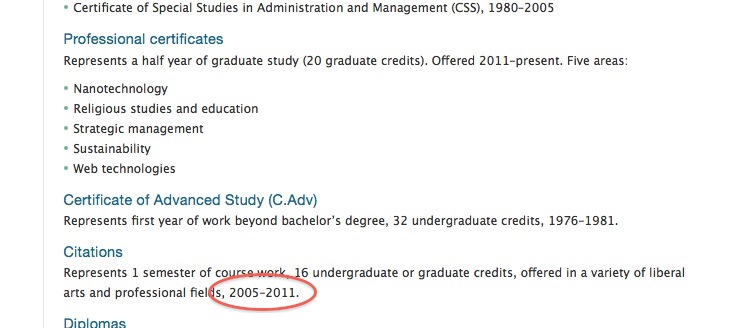If you are a graduate of the Harvard Extension School, how should you list this accomplishment on your résumé, or on LinkedIn?
That’s easy. You type “Harvard Extension School” in the place where the university name is supposed to go. For the degree name, write out “Bachelor of Liberal Arts” or “Master of Liberal Arts”, or type the official designation, ALB or ALM. Then add “Museum Studies”, “History”, “Biology”, “Information Technology”, “Management”, or other concentration in the place where the field of study is listed.
Simple, right? It clearly identifies the school you attended, the degree you received, and what you studied.
However, for some Harvard Extension School graduates, it is not so simple. For evidence of this, take a look at this comment on a recent Atlantic essay about the Extension School:
I have a master’s degree from Harvard obtained through the HES. My diploma says Harvard University (in latin no less). I have had headhunters and recruiters question me on it and state that it was misleading for me to list Harvard University as my school. My diploma says Harvard University, my classes were all taken on campus at Harvard (before online classes were popular), so many had to be taught by Harvard professors and not instructors, I completed all the degree requirements. I don’t see anything misleading and I don’t know how else to list it on my resume.
The headhunters are right. It is misleading. Every student and alumnus at Harvard identifies with the school he or she is affiliated with. Harvard Medical School students will tell people they go to the Harvard Medical School, or “the Med school.” Harvard Business School students identify with the “B-school” or HBS. Law School. Divinity. Ed school. Kennedy school. And so on.
To outsiders, things are a bit different. “Harvard” or “Harvard University” is synonymous with “Harvard College” in the eyes of the public, and many people in the corporate world. At the graduate level, “Harvard University” is associated with the Graduate School of Arts & Sciences programs that lead to MAs and PhDs. The Extension School is very different than the College or the advanced programs in GSAS.
As for the comment that she doesn’t know how to list the name of her school on her resume, why not list “Harvard Extension School”?
This question gets to the heart of the identity issue. Some graduates don’t want to admit they attended the Harvard Extension School – even though Harvard Extension School transcripts enable some graduates to take up advanced study at Harvard, Oxford, and elsewhere, other Extension School graduates deliberately take advantage of the “Harvard University” umbrella to mislead people into thinking they attended highly selective College or GSAS programs. Indeed, every few years in The Crimson there are reports of Extension School students (matriculated or not) insinuating or outright claiming to be College students to other people at Harvard. It happens all the time.
But there’s another possibility: The Extension School tells its graduates that it’s actually OK to use “Harvard University” as long as graduates also include the bogus “in Extension Studies” designation when spelling out the name of the degree (NOTE: The guidelines changed in 2014; please see the update at the bottom of this post):
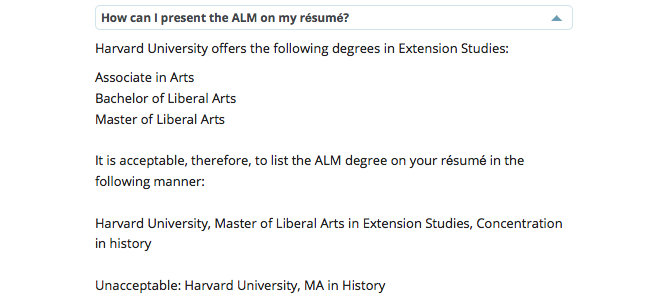
No one at the Harvard Extension School majors in “Extension Studies”, so why do we have to state this on our résumés? The only reason I can think of is to compensate for the misleading use of “Harvard University”. But if you are clearly stating the name of the school (e.g., Harvard Extension School) instead of “Harvard University” there is no need to add this inaccurate and demeaning qualifier to the name of the degree.
The requirement to use “in Extension Studies” can cause real problems, as one ALB graduate found out a few years ago and described on a now defunct online Extension School forum:
Want to add my 5 cents to the problem. I graduate with ALB in 2014; currently enrolled in ALM, Software Engineering.
For the last 6 months I’ve been looking for jobs in the US (I’m a remote foreign student). HES doesn’t provide student visas for foreign students, so it was already a challenge to find companies that would even consider interviewing someone with a US degree, but without a temporary permit to work after graduation (so called OPT). I was aware of that from the very beginning, but didn’t expect to that so few companies actually work with foreigners without experience. In case you’re interested, I didn’t get a single offer in Boston even though I tried really hard to move there. Luckily NYC and San Francisco were much more visa-friendly cities.
After I found a couple of companies who were ready to interview despite the required visa sponsorship and almost lack of experience, I had to explain “liberal” part of the degree name (nobody actually paid attention to “Extension School” words). It wasn’t too bad since most HRs and engineers I talked to were more interested in my actual knowledge and whether I can confirm that I know the things I listed in my resume. Liberal/extension “flaw” wasn’t much of a concern for them (including big companies, e.x. Google, Microsoft). And I personally felt fine about that since my program of study really wasn’t that rigorous compared to the college one (I skipped a couple of math classes that I wasn’t interested in).
However, after I got a job offer and started to work with the lawyers the real troubles came into play. The degree officially says “in extension studies” rather than “in Computer Science” whereas the transcripts specify concentration (sciences), field of study (computer science) and a minor (thesis/research). The lawyers immediately saw an inconsistency between transcripts and the diploma. For a couple of days I was explaining to them how HES works, provided links to the web site and even contacts of HES admission office for further inquiries. In the end, my attorney said that they’ll have to send my degree for special evaluation to confirm Computer Science concentration because the transcripts specify one thing and the diploma a different one.
I’m sure it will all work out and I’ll get an additional paper from some evaluation service that will confirm that my degree is a real computer science degree, but Harvard should feel embarrasses that lawyers have to send a degree from Harvard with transcripts to verify the field of study mentioned in the transcripts.
In short, I don’t complain about “liberal” arts or requirement to specify Extension School in my resume and about frankly explaining to employers what school I attended and why. I slightly object the lack of F1 support because that wasn’t the case before 2009. However, I strongly feel that the degree conferred in Harvard Yard in Tercentenary Theatre with all other Harvard diplomas should not be a subject for any additional verification or legal doubts.
This young student is absolutely right. There should not be any doubt or questioning about the degree he received, yet he was subjected to something that graduates from other Harvard schools would never experience. Three stupid words — “In Extension Studies” — threatened his ability to work at a job that he was otherwise qualified to do. (Note, however, that some Harvard Extension School grads have been able to get jobs at major tech companies, such as this ALB grad who got hired by Google).
A convenient excuse
Of the Extension School graduates who do state “Harvard University” on their resumes and LinkedIn profiles, most leave out the required “In Extension Studies” label that the Extension School demands. Their argument: “Harvard Extension School is one of the 13 degree-granting schools, therefore I have the right to use ‘Harvard University’.” It’s a convenient excuse that lets them sidestep the stigma and questions from colleagues and recruiters. The comment above as well as many of the responses to this blog post reflect this attitude.
There is an exception to the official Harvard Extension School résumé guidelines: People who have completed the ALM in Management (ALMM) program are supposed to use “Harvard University” and “Extension School”, but not “In Extension Studies”. Here’s the screen shot from the current Extension School website (NOTE: this is no longer accurate, see 2020 note at the bottom of this post):
Why this exception? My guess is the Harvard Business School got tired of fakers running around suggesting that they had completed the Harvard MBA program …. or the Extension School wanted to avoid friction with the B-School.
The Old Guidelines Were Bogus, Too
It should be noted that the guidelines have changed several times since I started the original Harvard Extension blog. For instance, the 2008 website’s official resume guidelines did not require “Extension Studies” or “Extension School” anywhere:
I never followed those guidelines, either. I felt “Harvard University, Master of Liberal Arts, Concentration In History” was misleading and not representative of the degree that I earned through the Extension School. It could easily be confused with a Harvard GSAS degree. I have always used “Harvard Extension School” on my LinkedIn profile and paper versions of my resume, and clearly state this fact on this blog and elsewhere.
Bottom line:
- Be proud of your school. As anyone who has completed the ALB or ALM programs know, it requires years of dedicated study and some extremely challenging academic requirements, from the Harvard Extension School admissions requirements to the ALM graduate thesis. People who take online classes have it even harder, as there are no nearby students to turn to for support and it’s often impossible to ask questions during class or interact with faculty.
The Extension School’s official guidelines obfuscate the degree and serve no one except for those graduates who want to claim “Harvard” on their resumes while avoiding the actual name of the school (no longer true since the Extension School updated its guidelines to allow “Harvard University Extension School” while dropping “in Extension Studies”).- If you insist on using “Harvard University” on your resume while knowing that most people reading it will assume it refers to Harvard College or GSAS, you’re either fooling yourself or are deliberately misleading people. When people find out, it not only makes you look bad, it reflects badly on all of us.
- Be clear about where you attended school at Harvard, and be clear about what you studied. People expect it, and it’s the right thing to do.
2014 Update: A comment on this post in October 2014 alerted me to the change in the official guidelines. The school now allows two methods of listing your Extension School degree on your resume:
-
Bachelor [or Master] of Liberal Arts, Harvard University Extension School. Include concentration or field of study, minor, and degree honors when applicable.
-
Bachelor [or Master] of Liberal Arts, Extension Studies, Harvard University
Clearly the school wants alumni to include “Extension” somewhere in the listing.
2019 Update 1: Another comment on this post notes that the guidelines have changed yet again. Now, the concentration is removed:
On your résumé, the degree name may be listed as either:
Bachelor [or Master] of Liberal Arts, Harvard University Extension School.
Bachelor [or Master] of Liberal Arts, Extension Studies, Harvard University.
But “Extension” is clearly stated in both cases.
2019 Update 2: An Extension School fan/follower says he received via email the following clarification from the Extension School regarding how to list degrees on resumes/CVs, which follows the 2014 guidelines:
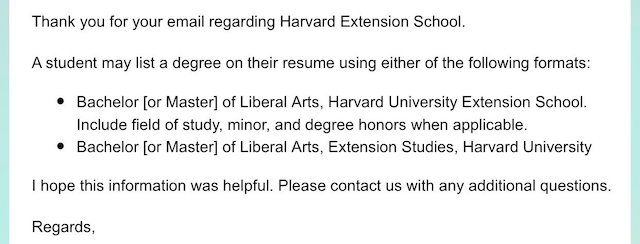
However, as of May 22, 2019, the Extension School website still shows this:

Meaning anyone who reviews the official Harvard Extension School guidelines on the Extension School website will still think it’s not OK to list the concentration. That is, it’s either “in Extension Studies,” or nothing.
As someone noted on Twitter, “It’s absurd to think it’s unethical to mention your concentration or field of study on your resume.”
2019 Update #3: The Harvard Extension School has reverted the language back to 2014, thanks to a persistent supporter and (I suspect) Dean Huntington Lambert being tagged in a Twitter thread about the issue. First, what the site now says:

Second, the context as explained in an email to a Harvard Extension supporter:
Resumes are important to HES alums and new grads, and it seem amazing that the web page explaining the official resume guidelines would be treated so cavalierly. I give credit to Lambert and his staff for quickly correcting this oversight, but it also makes me wonder what else has been stripped away from the official Extension School website in order to “reduce clutter.”
2020 Update: A comment by Laura alerted me to the fact that the official resume guidelines for ALM Management degrees are now grouped with the guidelines for other Harvard Extension School degrees.
See also:
- The number of Harvard Extension degrees triple in 13 years. Why?
- Harvard Extension faculty and the Harvard Instructor requirement
- What happened when Dean Shinagel tried to remove “In Extension Studies”
- Extension School students and the “Extension Studies” controversy
- What employers think about Harvard Extension School degrees

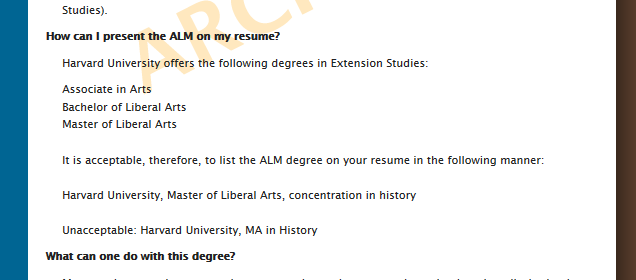
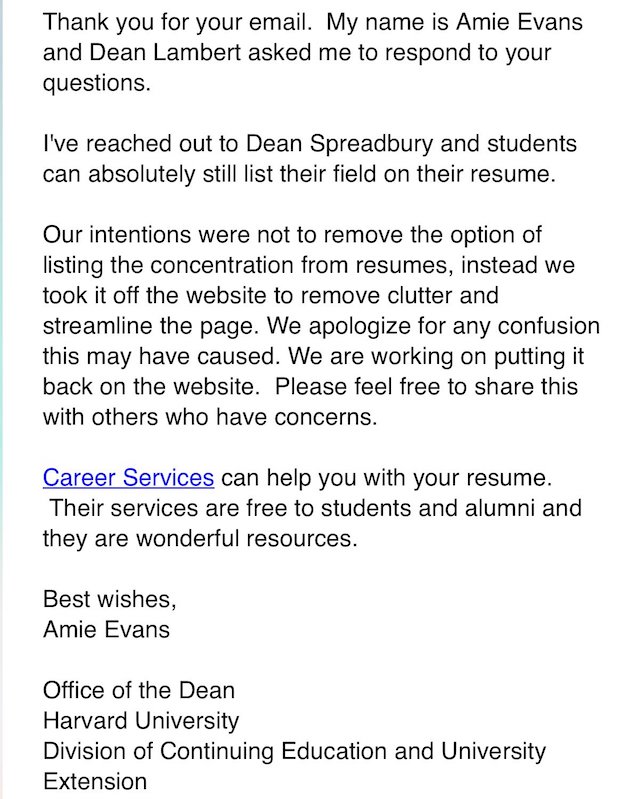

 The Chronicle of Higher Education has a great two-part feature, “
The Chronicle of Higher Education has a great two-part feature, “

